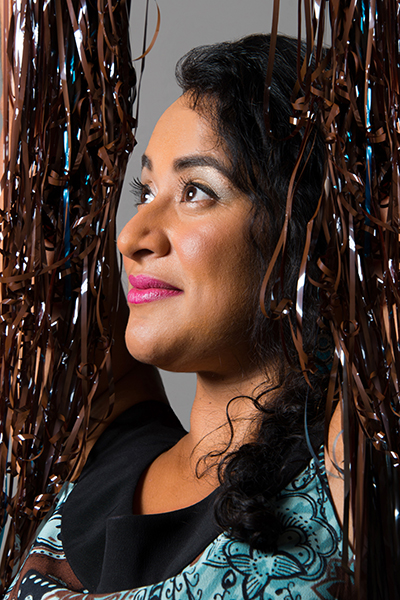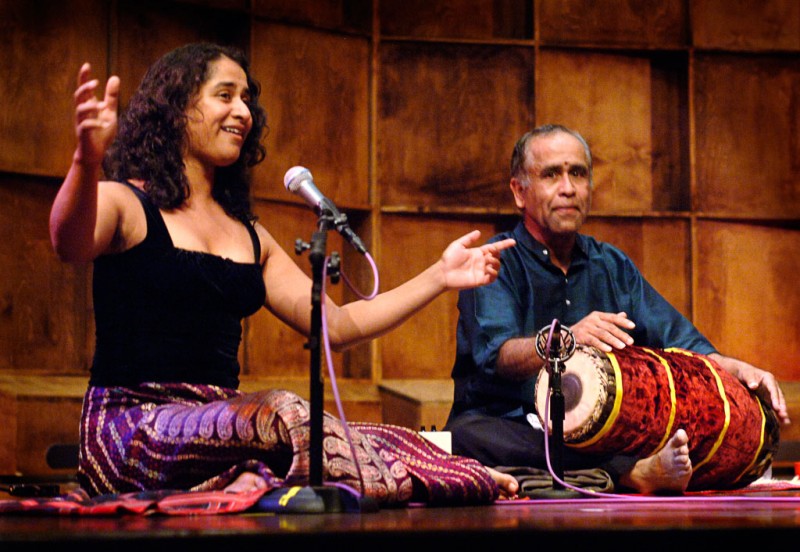We are thrilled to welcome world/fusion vocalist Suba Sankaran to the Tafelmusik stage in The Indigo Project. Suba has composed and produced music for theatre, film, radio, and dance. She currently teaches in the jazz department at Humber College, co-directs Toronto’s City Choir, is artistic associate at Confluence Concerts, and is co-sound designer, composer, and performer with Why Not Theatre/Shaw Festival’s upcoming production of the epic story, Mahabharata. We sat down with Suba to learn a bit more about her and her music-making.
Tafelmusik: How are you preparing for this concert?
 Suba Sankaran: I have been doing a lot of research — with the help of my father — to find the music that most appropriately matches the script and the narrative being told in the concert. I am also practising nearly every day since we solidified the program, partly because we are in baroque tuning, so my ears and voice need to adjust to that! The songs are mostly ones that I’ve sung for most of my life, but many of the arrangements are new and involve not just me and my father, but also choirs as well as the Tafelmusik Orchestra.
Suba Sankaran: I have been doing a lot of research — with the help of my father — to find the music that most appropriately matches the script and the narrative being told in the concert. I am also practising nearly every day since we solidified the program, partly because we are in baroque tuning, so my ears and voice need to adjust to that! The songs are mostly ones that I’ve sung for most of my life, but many of the arrangements are new and involve not just me and my father, but also choirs as well as the Tafelmusik Orchestra.
TM: What do you hope audiences will take away from this concert?
SS: I hope that audiences will develop a deeper knowledge and appreciation of the sophisticated and beautiful music that comes out of South India, particularly the intricacies within the melodies and rhythms, and the fact that there are many elements that connect the cultural dots between Western and Eastern music. Taking the veil off of the “exoticism” of this culture’s music, and diving deeper into the history and geography, as well as social and political ramifications of the music, is essential to its understanding.
TM: When did you first start singing?
SS: I began singing when I began speaking, at around the age of two. One of the beauties of being born into a musical family is that one is instantly immersed in the art and culture from birth and it becomes a part of your very essence. Around age six, I began classical piano lessons, sang in elementary school choirs, and began rudimentary training on mrdangam, kanjira, and solkattu (vocal percussion).
TM: Describe your first musical gig.
SS: The first gig I ever experienced was when I was four years old. It was at Wesleyan University and their world music department was presenting a concert for Navaratri, a Hindu festival celebrated every year, spanning nine nights in the autumn. It celebrates the three Hindu goddesses: Durga, Saraswathi and Lakshmi. My sister and I and two other youngsters were asked to open the concert with an invocation. We were taught Santhatham Paahimaam — a song in this very Tafelmusik program — and it was written/adapted by one of south India’s Trinity composers, Muthuswamy Dikshitar. He used the tune of “God Save The King/Queen,” and changed the lyrics so that it amounted to something like “God Save Everyone.” I remember thinking (even at that young age) that this inclusive idea was really lovely.
The auditorium was at capacity, and my young self was excited to believe there were thousands of audience members listening. That was my first taste of being on stage, and I loved singing to and for the world in front of me! It certainly set me up to love the stage like a second home.
TM: Who has been your greatest inspiration?
SS: My father continues to be a great inspiration especially in the ways of improvisation, dedication, and discipline to his art. Next to him, Peter Gabriel is an influence on my work as a world-fusion artist. Joni Mitchell is an inspiration to me especially regarding songwriting, lyric-writing poetry, and the confluence of artistic practices.

Suba and Trichy Sankaran. Photo credit: Greg Locke.
TM: What is your favourite music to listen to?
SS: As a child of the 80s, I think my favourite go-to music is still 80s pop! I listen to a lot of a cappella, as that’s a huge part of my musical activity, and also a variety of world music, jazz, and classical/early music as well.
TM: What is your favourite thing to do during your free time?
SS: It’s a tie between walking, gardening, and cooking. Being a freelancer is a constant juggling act, so these activities give me time to breathe, to decompress, to stay calm and focused, and it provides me with great joy, energy, and sustenance in the process.
TM: What is your favourite place in the world?
SS: I’ve had the great fortune of touring many parts of the world, so this is a challenging question! I’d have to say Bali is one of the most interesting places I’ve visited with my husband and musical partner, Dylan Bell. It’s been many years, but we’d love to return some time soon. It was a feast for the senses, deeply rich in arts and culture. The people are open and beautiful, and the music and dance are out of this world.
TM: Which composer/artist/hero, living or not, would you like to sit next to at a dinner party, and why?
SS: I have always wanted to sit next to Hildegard Von Bingen to one side, Johann Sebastian Bach on the other, and Bobby McFerrin across from me! I feel that, as a female polymath, Hildegard would not only shed light on art and mysticism, but she would feed me with ideas about a human’s limitless potential for development through the understanding of many subjects. This would lead to ideas of how to help in sustaining, then maintaining, our place in an ever-shifting world. As for Bach, there is such a beauty in the art and architecture of his music. I feel that, again, we as human beings can learn to find the essence of selves by sifting through the complexities within our lives and work. Bach’s music is complex, so the more you listen, the more you hear. I think there are parallels to how we can dig deeper into our own society to find more meaning, relevance, understanding, and compassion. Bobby McFerrin is one of my muses. He is a one-man band who uses his voice and body as an honest vehicle for his creative pursuits. I had the amazing opportunity to improvise with him on stage once, so I think he would turn our dinner party into a kitchen jam, and we would all improvise together in various styles and simply play!
TM:What words of wisdom would you pass on to budding musician?
SS: You are a storyteller through your music: use that ability wisely and honestly, and remember that the expression you give far outweighs the impression you seek to make.
Be kind: the music community (and the world) is small, and word will get around as to who you are, and how you play with others!
Practise! Carve out the time to be efficient and effective when you’re practising, and remember that it won’t feel like work if you truly love what you’re doing.
Join Suba and Tafelmusik in The Indigo Project from February 27 to March 3. BUY TICKETS
